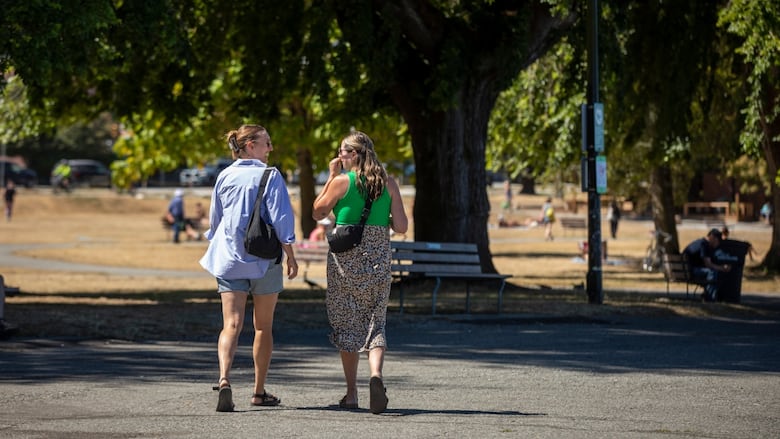Worried about 'wasting' sunny days during the summer? Sunshine guilt isn't uncommon
'Catch up on shows? Whatever. There's always someone at the beach'

Around half past noon on a Tuesday in late July, Casey Blustein zipped a tennis racket into his backpack and made the quick walk to the waterfront tennis courts at Vancouver's Kitsilano Beach. He had an hour for lunch and wasn't about to spend it near his desk when the temperature had hit a prime 25 C.
"We live in Canada, so we only have four months of summer," said Blustein. "When you're sitting at home doing nothing, you're feeling guilty. Like, there's always something more I could be doing."
Blustein, 32, measures the time since his move from Toronto by his summers spent in Vancouver — this year is his fourth.
"I don't even turn my Xbox on the entire summer. Catch up on shows? Whatever. There's always someone at the beach, there's always a bike ride you could be going on," he said. "You see videos of people in the backcountry and it's like, 'Ah, I could be going and doing that.' Why would I want to be in the city doing nothing?"

Psychologists say it's not uncommon to feel pressure to spend as much time outside as possible during the fleeting summer months, which can lead some people to feel badly if they're stuck inside. So-called "sunshine guilt" is especially acute in Canada, experts say, because of the sense of urgency to maximize nice weather before it's gone.
Summertime sadness
Changing seasons often bring up different emotions as routines change and summer is no exception. Seasonal affective disorder can affect people during hotter months and climate anxiety can hit harder as temperatures spike and wildfires begin.
For some, it can manifest as anxiety about making the most of a beautiful day rather than "wasting" hours on downtime or work inside. And videos on Instagram or TikTok showing friends and family having what looks like a great time can compound those feelings.
"We have the fear of missing out. You're like, 'OK, I need to go, I need to enjoy the summer because it's really not long,'" said Yohana Combari, 27, a Montrealer who wanted to spend the last of her five-day West Coast vacation parked on a beach blanket in Kitsilano. "I want to enjoy every minute."
Aurora Tejeida, 36, used to take sunny days for granted growing up in Mexico.
But after living in Vancouver for more than a decade, she's started moving her sapphic novel book club outside when she can. This month, they'll meet at Kitsilano Beach to talk about Anna Dorn's Perfume and Pain. ("Not my favourite this year," she said.)
"I feel like I need to take advantage of a sunny day whenever I have the chance," the communications manager said in an interview from her home on Commercial Drive. "The guilt is so overwhelming that, towards the end of the summer, I'm kind of ready for fall because then you don't have to feel guilty about staying home and watching a movie or something."

Robyn Manzano, a registered psychologist and the clinic director of Refresh Counselling in Calgary, said summertime shame and guilt come up in her practice all the time. She said the fixes can be tiny — be it a few minutes spent outside in the morning with a mug of coffee or a walk around the block after dinner.
"It could just be, 'OK, I'm going to go stand outside for a little bit and bask in the sun," she said. "Or the thing that I'm doing indoors, can I take it outside? Or, you know, can I have a picnic? Can I read my book outside? Can I watch whatever it is outside?"
Emily Hemendinger, an assistant professor of psychology at the University of Colorado, said summer doesn't have to be perfect to be great — and rest is nothing to feel guilty about.
"Practising self-compassion in this case looks like giving yourself permission to show up how you need to show up in life in that moment ... to not be doing all the things, or to not be living the most exciting and Instagram-worthy life," said Emily Hemendinger, an assistant professor of psychology at the University of Colorado.
"Mindfulness allows us to drop into that moment and focus on one thing, one activity, one thought, one moment at a time," she continued. "Instead of thinking that every weekend needs to be packed with activities, try to check-in with yourself and gauge your energy and capacity. Maybe try picking five out of the 20 activities you want to participate in."
During the summer, Blustein tries to structure his workday so he can get meetings out of the way in the morning and spend the rest of the day on paperwork, emails and Slack messages. He doesn't mind the urgency of the summer season pushing him to do more but can understand why others might have a hard time.
"I'm a pretty big extrovert, so I don't need the battery recharging time — but a lot of people do," he said, rushing to start his tennis game before his lunch break ended. "I don't know how they get that in the summer."
